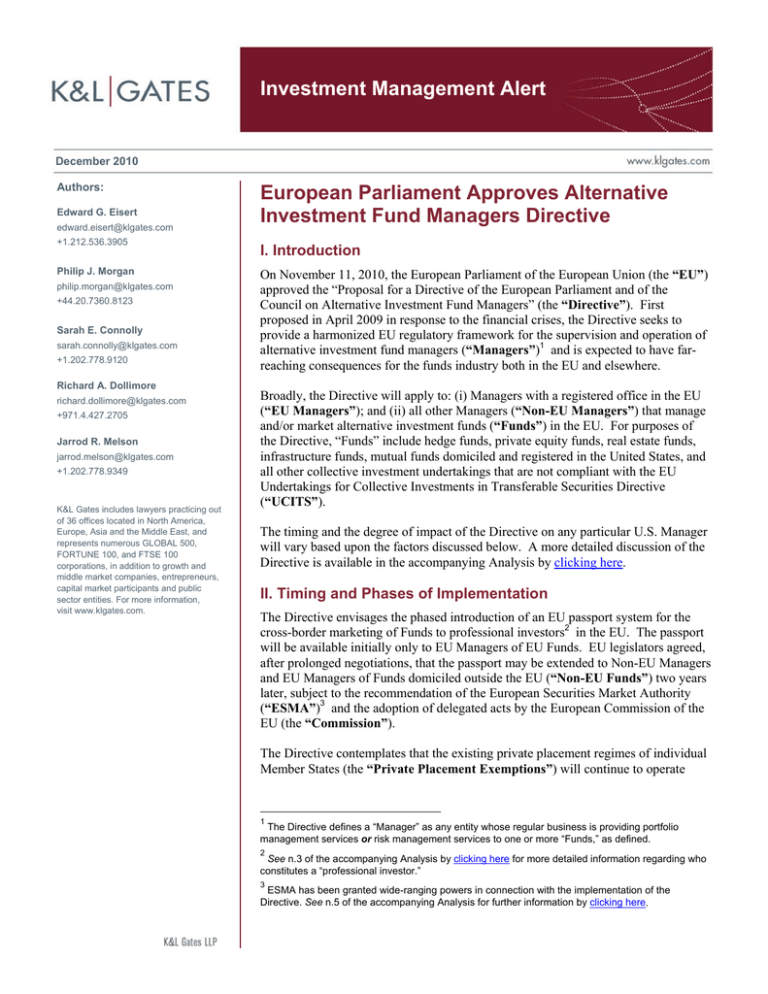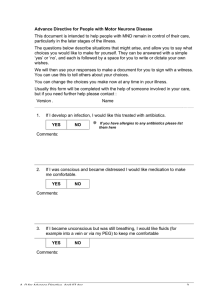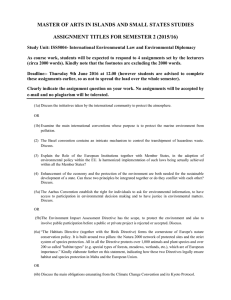
Investment Management Alert
December 2010
Authors:
Edward G. Eisert
edward.eisert@klgates.com
+1.212.536.3905
Philip J. Morgan
philip.morgan@klgates.com
+44.20.7360.8123
Sarah E. Connolly
sarah.connolly@klgates.com
+1.202.778.9120
Richard A. Dollimore
richard.dollimore@klgates.com
+971.4.427.2705
Jarrod R. Melson
jarrod.melson@klgates.com
+1.202.778.9349
K&L Gates includes lawyers practicing out
of 36 offices located in North America,
Europe, Asia and the Middle East, and
represents numerous GLOBAL 500,
FORTUNE 100, and FTSE 100
corporations, in addition to growth and
middle market companies, entrepreneurs,
capital market participants and public
sector entities. For more information,
visit www.klgates.com.
European Parliament Approves Alternative
Investment Fund Managers Directive
I. Introduction
On November 11, 2010, the European Parliament of the European Union (the “EU”)
approved the “Proposal for a Directive of the European Parliament and of the
Council on Alternative Investment Fund Managers” (the “Directive”). First
proposed in April 2009 in response to the financial crises, the Directive seeks to
provide a harmonized EU regulatory framework for the supervision and operation of
alternative investment fund managers (“Managers”)1 and is expected to have farreaching consequences for the funds industry both in the EU and elsewhere.
Broadly, the Directive will apply to: (i) Managers with a registered office in the EU
(“EU Managers”); and (ii) all other Managers (“Non-EU Managers”) that manage
and/or market alternative investment funds (“Funds”) in the EU. For purposes of
the Directive, “Funds” include hedge funds, private equity funds, real estate funds,
infrastructure funds, mutual funds domiciled and registered in the United States, and
all other collective investment undertakings that are not compliant with the EU
Undertakings for Collective Investments in Transferable Securities Directive
(“UCITS”).
The timing and the degree of impact of the Directive on any particular U.S. Manager
will vary based upon the factors discussed below. A more detailed discussion of the
Directive is available in the accompanying Analysis by clicking here.
II. Timing and Phases of Implementation
The Directive envisages the phased introduction of an EU passport system for the
cross-border marketing of Funds to professional investors2 in the EU. The passport
will be available initially only to EU Managers of EU Funds. EU legislators agreed,
after prolonged negotiations, that the passport may be extended to Non-EU Managers
and EU Managers of Funds domiciled outside the EU (“Non-EU Funds”) two years
later, subject to the recommendation of the European Securities Market Authority
(“ESMA”)3 and the adoption of delegated acts by the European Commission of the
EU (the “Commission”).
The Directive contemplates that the existing private placement regimes of individual
Member States (the “Private Placement Exemptions”) will continue to operate
1
The Directive defines a “Manager” as any entity whose regular business is providing portfolio
management services or risk management services to one or more “Funds,” as defined.
2
See n.3 of the accompanying Analysis by clicking here for more detailed information regarding who
constitutes a “professional investor.”
3
ESMA has been granted wide-ranging powers in connection with the implementation of the
Directive. See n.5 of the accompanying Analysis for further information by clicking here.
Investment Management Alert
alongside the new passport system for a period of
time but, ultimately, may be eliminated. Under the
passport system, Managers will be authorized to
market Funds only to professional investors,
although the Directive authorizes Member States to
permit marketing to other investors under their
Private Placement Exemptions.4
III. Immediate Effect
When the Directive enters into force (which is
expected to be in early 2011), it will not have any
immediate effect on Managers. The Directive will
be binding only on the Member States, which,
within two years, will be required to adopt laws that
will implement the Directive’s requirements at the
national level. Until Member States adopt such
laws, U.S. Managers may continue to manage EU
Funds and/or market Funds into the EU under
existing Private Placement Exemptions without
being subject to any new requirements under the
Directive. It is possible that Member States may not
implement the Directive simultaneously; thus, there
may be a “rolling” implementation schedule.
IV. Requirements as of 2013
A. Disclosure and Reporting
Once the Directive is implemented into Member
States’ national laws, a U.S. Manager that markets
Funds in the EU will be subject to certain disclosure
and reporting requirements under the Directive.
Among other obligations, the U.S. Manager will be
required to provide disclosures to investors in the
Funds that it markets (at the time of investment and
periodically thereafter) as well as annual reports to
investors and Member State regulators with respect
to each Fund that it markets in the EU.5
At present, U.S. Managers that market Funds subject
to U.K. private placement rules often voluntarily
provide investors with much of the disclosure
required under the Directive, even though such
disclosures are not legally required. Except for the
requirement to include certain disclosure legends on
offering documents to EU investors, a U.S. Manager
4
For purposes of the Directive, a “retail investor” is any
investor who is not a professional investor.
5
See Section III.C.2 of the accompanying Analysis for more
information by clicking here.
is subject only to restrictions on the persons to
whom it may market and on certain activities
conducted in the U.K., such as investor roadshows.
In addition, at present, there is no requirement for a
U.S. Manager to supply any specific information to
EU regulators.
B. Controlling Interest Disclosure
A U.S. Manager also will be subject to new
requirements if the Funds it manages take
significant stakes (over 50%) in non-listed
companies. As a matter of practice, these rules
typically will not apply to funds commonly referred
to as hedge funds.6
C. Conditions to Using Private Placement
Exemptions
In addition, a U.S. Manager will be allowed to rely
on Private Placement Exemptions only if: (i) there
are in place appropriate cooperation arrangements
for the efficient exchange of information between
the authorities of the United States, the Member
State where the Fund is to be marketed and the
Fund’s country of establishment (the “Cooperation
Condition”); and (ii) the United States is not listed
as a Non-Cooperative Country and Territory by the
Financial Action Task Force on money-laundering
and terrorist financing (the “AML Condition”).
At present, the United States, every EU Member
State and all popular offshore jurisdictions,
including Bermuda, the British Virgin Islands, the
Cayman Islands, the Isle of Man and Jersey, satisfy
the AML Condition. In addition, the major
financial services regulators of the United States,
most EU Member States and the offshore
jurisdictions referenced above have entered into a
“memorandum of understanding” under which they
have agreed to provide each other mutual assistance
to facilitate the enforcement of, or to secure
compliance with, their respective national laws and
regulations.7 Guidance from ESMA and/or
measures adopted by the Commission to implement
6
See Section III.C.3 of the accompanying Analysis for more
information by clicking here.
7
See IOSCO Multilateral Memorandum of Understanding
Concerning Consultation and Cooperation and the Exchange
of Information (2002). Ireland is among the few EU Member
States that are not signatories to the memorandum.
December 2010
2
Investment Management Alert
the Directive should clarify whether the
“memorandum of understanding” is an adequate
“cooperation arrangement” for the purposes of the
Cooperation Condition.
Although the Cooperation Condition and the AML
Condition will be new requirements for U.S.
Managers marketing Funds in the EU, it is expected
that existing Private Placement Exemptions will
remain largely unchanged under the Directive. For
instance, the Directive authorizes Member States to
permit Managers to market to “professional
investors” and, subject to the requirements of
individual Member States, to investors that are not
professional investors (i.e. “retail investors”). With
this flexibility, Member States are likely to maintain
the status quo with respect to the types of investors
to whom Managers may market in their respective
jurisdictions. Also, because the Directive’s
requirements apply in addition to any stricter
requirements that Member States may impose under
their Private Placement Exemptions, the Directive
may not change the existing situation in Member
States (e.g., France and Italy) that currently prohibit
most private placements of Non-EU Funds within
their territory by Non-EU Managers.
V. Requirements as of 2015
Approximately two years after the Directive is
required to be transposed into national law, if ESMA
recommends the introduction of the passport system
for Managers based outside of the EU, a U.S.
Manager wishing to market Funds into the EU may:
(i) continue to rely on Private Placement
Exemptions, in compliance with the requirements
outlined above; or (ii) begin using a passport. In
addition, at that time, a U.S. Manager that manages
EU Funds must become authorized under the
Directive, regardless of whether it markets those
Funds in the EU.
A U.S. Manager that manages EU Funds and/or
wishes to market Funds in the EU with a passport
must be authorized by its “Member State of
reference,” which is, broadly speaking, the Member
State with which the Manager has the greatest
connection. U.S. Managers will be required to have
a legal representative established in their Member
State of reference. In addition to serving as the
Manager’s contact point in the EU, the legal
representative will perform a compliance function
with respect to the Manager’s management and/or
marketing activities under the Directive. It is
unclear how this requirement will apply in practice,
given the practical difficulties an EU-based entity
would encounter in monitoring an offshore
Manager, as well as the Directive’s silence as to the
legal representative’s liability for the Manager’s
noncompliance with the Directive.8
A U.S. Manager will be granted authorization only
if: (i) the Cooperation Condition and the AML
Condition are satisfied with respect to the United
States; (ii) the “effective exercise by the competent
[Member State] authorities of their supervisory
functions under this Directive is not prevented by
the laws, regulations or administrative provisions of
the [the United States], nor by limitations in the
supervisory and investigatory powers of the [U.S.]
supervisory authorities”;9 and (iii) the United States
has entered into an agreement based on Article 26
of the OECD Model Tax Convention with the
Manager’s Member State of reference and each
other Member State in whose territory the Fund is
proposed to be marketed (the “Tax Treaty
Condition”).
As noted above, the United States and a number of
popular offshore jurisdictions satisfy the AML
Condition and have in place a “memorandum of
understanding” that may satisfy the Cooperation
Condition. The Directive authorizes the Non-EU
Manager’s Member State of reference to determine
whether the Manager satisfies the second condition,
although guidance from ESMA and/or
implementing measures by the Commission may
clarify the scope of the condition. Guidance from
ESMA and/or implementing measures adopted by
the Commission also may confirm whether the
United States’ existing tax treaties satisfy the Tax
Treaty Condition. In addition, for U.S. Managers
marketing Non-EU Funds, the three conditions
8
It is possible that the legal representative will constitute a
“permanent establishment,” of either the U.S. Manager or of
the Fund, for tax purposes with the result that a proportion of
the profits of the U.S. Manager or the Fund would be taxable
in the jurisdiction of the legal representative. In practice,
however, an exemption from “permanent establishment”
status should be available under the relevant tax legislation
governing the legal representative.
9
Art. 37(7)(g) of the Directive.
December 2010
3
Investment Management Alert
above must be satisfied with respect to the Non-EU
Fund’s country of establishment.
Finally, for as long as a U.S. Manager is managing
EU Funds and/or marketing Funds in the EU with a
passport, such Manager must comply with all the
requirements in the Directive, except for Chapter VI
(which addresses the rights of EU Managers to
manage and market Funds in the EU).
Noncompliance with a Directive provision is
permitted only in “very exceptional circumstances”
if the U.S. Manager can demonstrate that it is
“impossible” to comply with that provision in
combination with a mandatory rule of the
Manager’s, and/or Non-EU Fund’s, respective home
jurisdictions. The relevant national law must
provide an “equivalent rule having the same
regulatory purpose and offering the same level of
protection to the investors of the relevant [Fund],”10
and the Manager and/or the Fund must comply with
that rule. Therefore, although U.S. Managers will
find several requirements of the Directive to be more
onerous than those under the U.S. federal securities
laws (e.g., provisions governing remuneration,
leverage, valuation and capital requirements), they
would need to satisfy a very high threshold to be
exempted from any of the Directive’s
requirements.11
VI. Requirements as of 2018
Approximately three years after the passport system
is introduced for Non-EU Managers (if indeed it is
introduced), ESMA will recommend whether to
abolish the Private Placement Exemptions. Provided
that ESMA so recommends, the Commission may
specify a date when all Private Placement
Exemptions will be terminated, but which will be no
earlier than 2018. After that time, all Non-EU
Managers that manage EU Funds and/or market
Funds in the EU must be authorized under the
Directive and comply with all of the Directive’s
requirements, unless the Non-EU Manager can
demonstrate that it is “impossible” to comply with a
10
11
Art. 37(2)(ii) of the Directive.
In particular, U.S. Managers and U.S. Funds subject to the
Directive may have difficulty complying with the Directive’s
depositary requirements as well as the applicable custody
rules under U.S. federal securities laws. See Section III.E of
the accompanying Analysis by clicking here.
provision of the Directive, as discussed above.
Therefore, if the Directive is implemented as
envisaged, U.S. Managers will have at least seven
years after the Directive’s entry into force during
which they may continue marketing EU and NonEU Funds in the EU in reliance on Private
Placement Exemptions.
It is also unclear from the Directive whether, after
Private Placement Exemptions are abolished (if
indeed they are), U.S. Managers will be permitted to
market Funds to investors other than professional
investors. The Directive permits Member States to
allow U.S. Managers to market to retail investors
under Private Placement Exemptions, but does not
expressly provide for the marketing of Funds to
investors other than professional investors under the
passport regime. This is important because the
Directive’s definition of “professional investor,” at
least insofar as it applies to natural persons, is
significantly more restrictive than the definitions of
“accredited investor,” “qualified purchaser” and
“qualified client” under the U.S. securities laws.
VII. Unsolicited Interest from EU
Investors
We note that the Directive is not intended to affect
existing practices under which a professional
investor domiciled in the EU invests, at its own
initiative, in Non-EU Funds managed by a Non-EU
Manager, provided that such Manager does not
market to such investors. The Directive defines
marketing as any direct or indirect offering or
placement at the initiative of the Manager.
Accordingly, even after the Directive is fully
implemented, a U.S. Manager should be able to
continue receiving unsolicited calls and subscription
requests from EU professional investors without
being subject to the Directive. It is unclear,
however, whether the Directive would apply if, for
instance, a U.S. Manager sends marketing materials
to EU investors in response to an RFP. Even if such
activity follows from investor-initiated contact, in
practice it may prove difficult to distinguish
“active” from “passive” marketing, absent further
clarification from the Commission.
VIII. Conclusion
The Directive will not have an immediate impact on
U.S. managers of alternative investment funds.
However, after the Directive is implemented into
December 2010
4
Investment Management Alert
Member States’ national laws (anticipated to be
early 2013), the phased implementation of its
requirements will impact U.S. managers to varying
degrees depending on their particular circumstances
and business models.
Anchorage Austin Beijing Berlin Boston Charlotte Chicago Dallas Dubai Fort Worth Frankfurt Harrisburg Hong Kong London
Los Angeles Miami Moscow Newark New York Orange County Palo Alto Paris Pittsburgh Portland Raleigh Research Triangle Park
San Diego San Francisco Seattle Shanghai Singapore Spokane/Coeur d’Alene Taipei Tokyo Warsaw
Washington, D.C.
K&L Gates includes lawyers practicing out of 36 offices located in North America, Europe, Asia and the Middle East, and represents numerous
GLOBAL 500, FORTUNE 100, and FTSE 100 corporations, in addition to growth and middle market companies, entrepreneurs, capital market
participants and public sector entities. For more information, visit www.klgates.com.
K&L Gates comprises multiple affiliated entities: a limited liability partnership with the full name K&L Gates LLP qualified in Delaware and
maintaining offices throughout the United States, in Berlin and Frankfurt, Germany, in Beijing (K&L Gates LLP Beijing Representative Office), in
Dubai, U.A.E., in Shanghai (K&L Gates LLP Shanghai Representative Office), in Tokyo, and in Singapore; a limited liability partnership (also named
K&L Gates LLP) incorporated in England and maintaining offices in London and Paris; a Taiwan general partnership (K&L Gates) maintaining an
office in Taipei; a Hong Kong general partnership (K&L Gates, Solicitors) maintaining an office in Hong Kong; a Polish limited partnership (K&L
Gates Jamka sp.k.) maintaining an office in Warsaw; and a Delaware limited liability company (K&L Gates Holdings, LLC) maintaining an office in
Moscow. K&L Gates maintains appropriate registrations in the jurisdictions in which its offices are located. A list of the partners or members in each
entity is available for inspection at any K&L Gates office.
This publication is for informational purposes and does not contain or convey legal advice. The information herein should not be used or relied upon
in regard to any particular facts or circumstances without first consulting a lawyer.
©2010 K&L Gates LLP. All Rights Reserved.
December 2010
5


